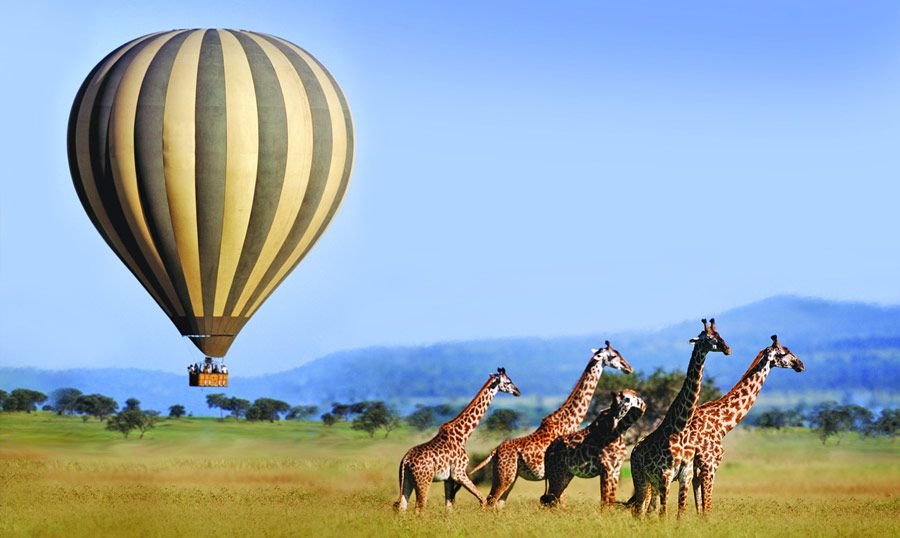Serengeti National Park


Here is where you get to witness the famous world show of “wildebeest migration”, it is among the World Heritage Site, biosphere reserve and one of the New seven wonders of Africa. This endless open plain indeed offers the most dazzling game viewing not only in Tanzania but Africa and the whole wide world. The perplexing ecosystem in this park will sure take your breath away.
What To Do: Game drive, balloon safari, short nature hiking, walking safaris, photographic safari,camping,bush meal and historical and cultural visit.
Tanzania’s most seasoned national park is likewise one of the world’s best-known wildlife asylums. At 14,763 sq. Kms, Serengeti is second in size just to Ruaha National Park and is absolutely a standout amongst Tanzania’s most valuable gems. The Serengeti is home to the world’s biggest and most fabulous wildlife migration, at the pinnacle of which it contains the biggest grouping of well-evolved creatures on earth. Flanking Ngorongoro toward the south and southeast, Kenya’s Maasai Mara toward the North, Maswa Game Reserve toward the west and southwest, Loliondo Game Reserve toward the east and coming to inside 8km of Lake Victoria toward the North West, any safari here guarantees wildlife in abundance, particularly when the yearly relocation of fields game and their going to predators is in living arrangement. Serengeti is derived from the Maasai word “Siringet” which means unlimited fields. As of late asserted the seventh overall miracle, Serengeti owes its unbelievable distinction to the yearly 800km movement of over 2.5 million animals, framing segments of animals up to 40kms long! The migration offers visitors with a standout amongst nature’s most amazing showcases, one in which the ever vigilant predators have indispensable influence.
Wildlife obviously is the thing that carries individuals to the Serengeti, and at that, the park isn’t inadequate. The majority of the big five can be spotted while on safari in Serengeti, with a wealth of other creature species that incorporate cheetah, Thomson’s and Grant’s gazelle, topi, eland, waterbuck, hyena, monkey, impala, African wild dogs and giraffe, jackals, Serval felines and some more. The park likewise gloats around 500 winged creature species, including ostrich, secretary feathered creature, Kori bustard, crowned crane, marabou stork, martial hawk, lovebirds and the numerous species of vultures. As prevalent as Serengeti may be, it’s vast to the point that you likely could be the main guest around when a Leopard quietly squats in the tall grass towards clueless impala, or when a Cheetah pursues down a Thompson gazelle at a break neck speed over the brilliant fields in an epic battle to satisfy the old saying of survival for the fittest in one of the world’s most beautiful wildlife asylums.
SEASON AND CLIMATES
Conditions in the Serengeti are seldom exhausting in the daytime during the Dry season (June to October), when the temperature remains pleasant and warm. It’s an alternate story around evening time, when the mercury can take a profound plunge. The warmth crawls up a couple of degrees during the Wet season (November to May), however the odd virus front can present a chill.
HOW TO GET THERE
As Serengeti National Park is a moderately disengaged, secured region, explorers for the most part need to travel for some time so as to achieve it. If flying into Kilimanjaro International Airport, it is an eight-hour drive to the recreation center, however voyagers likewise have the choice to fly locally into a territorial airplane terminal, for example, Arusha Airport and after that fly legitimately into one of the park’s airstrips.
HIGH LIGHTS
- Great Migration
- Hot Air Balloon Safari
- It is home to the biggest centralization of lion populace
- It is the most established Tanzanian National park.
- It is an UNESCO World Heritage Sites.
- Maasai individuals live in Mara district of Serengeti
ACTIVITIES
- Game Drives
- Night game drives
- Hot-air Balloon Safaris
- Cultural Safaris
- Guided Walking Safaris
- Bush dinners
- Picnics
- Camping
PROS AND CONS
Pros
- The most noteworthy grouping of wildlife in Tanzania
- A high populace of huge felines – it homes around3,000 lions, 1,000 panthers, and 8,000 Hyenas
- Can be joined with Ngorongoro to see the enormous five
- More “appealing” setting for photographic safaris
Cons
- No wild dogs
- A higher convergence of voyagers
- The Migration is precarious and creatures don’t keep to a calendar. It could be disillusioning if the crowds are early or late in their migration.

